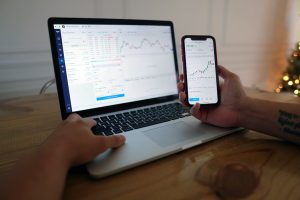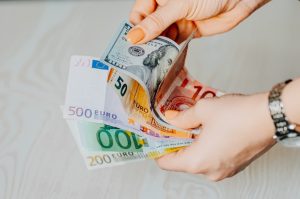Forex, or foreign exchange, is the global market where currencies are traded. It is the largest and most liquid financial market in the world, with an average daily trading volume of over $5 trillion. The forex market operates 24 hours a day, five days a week, and is accessible to traders from all over the world. In this article, we will explain how forex works and how traders can participate in the market.
The Basics of Forex Trading
The forex market is made up of different currency pairs, such as EUR/USD, USD/JPY, GBP/USD, and others. Each currency pair represents the exchange rate between two currencies. For example, the EUR/USD pair shows how many US dollars are needed to buy one euro.
When trading forex, traders aim to profit from the changes in exchange rates between currency pairs. They can do this by buying one currency while simultaneously selling another currency, or by selling one currency while simultaneously buying another currency. This is known as a forex trade.
For example, if a trader expects the euro to appreciate against the US dollar, they can buy the EUR/USD currency pair. If the exchange rate between the two currencies increases, the trader will make a profit. On the other hand, if the exchange rate decreases, the trader will experience a loss.
Forex trading is done through a broker, who acts as an intermediary between the trader and the market. The broker provides the trader with access to the market and executes their trades on their behalf. In exchange, the broker charges a commission or spread on each trade.
Factors Affecting Forex Prices
The exchange rate between currency pairs is influenced by a variety of factors, including economic and political events, central bank policies, and market sentiment.
Economic indicators, such as GDP, inflation, and employment data, can affect the value of a currency. For example, if a country’s GDP grows faster than expected, its currency may appreciate as investors become more confident in its economy.
Central banks also play a significant role in the forex market. They can influence the value of their currency by adjusting interest rates, buying or selling their currency in the market, or implementing other monetary policies.
Political events, such as elections, trade agreements, and geopolitical tensions, can also affect currency prices. For example, if a country is embroiled in a trade dispute, its currency may depreciate as investors become more risk-averse.
Finally, market sentiment, or the collective mood of traders, can also impact currency prices. If traders believe that a currency is overvalued or undervalued, they may buy or sell it accordingly, leading to changes in its exchange rate.
Types of Forex Trades
There are several types of forex trades that traders can use to profit from the market. Some of the most common include:
Spot Trades: These trades involve buying or selling a currency pair at the current market price.
Forward Trades: These trades involve agreeing to buy or sell a currency pair at a future date and a predetermined exchange rate.
Futures Trades: These trades involve buying or selling a currency pair at a future date and a predetermined exchange rate, but they are standardized contracts traded on an exchange.
Options Trades: These trades give the trader the right, but not the obligation, to buy or sell a currency pair at a predetermined exchange rate and within a specified time frame.
Risks of Forex Trading
Forex trading can be a high-risk, high-reward activity. Traders can make significant profits if they correctly predict exchange rate movements, but they can also experience substantial losses if their trades go against them.
To mitigate the risks of forex trading, traders should have a solid understanding of the market and the factors that affect currency prices. They should also have a trading plan that includes risk management strategies, such as stop-loss orders and position sizing.
In addition, traders should choose a reputable broker who is regulated by a reputable authority, such as the Financial Conduct Authority (FCA) in the UK or the Securities and Exchange Commission (SEC) in the US. This can help ensure that their funds are protected and that they are not exposed to fraudulent activities.
Conclusion
In conclusion, forex is a complex and dynamic market that offers traders the opportunity to profit from changes in exchange rates between currency pairs. Traders can participate in the market through a broker, and they can use a variety of trading strategies and instruments to achieve their goals. However, forex trading carries significant risks, and traders should take steps to mitigate these risks and protect their funds.






